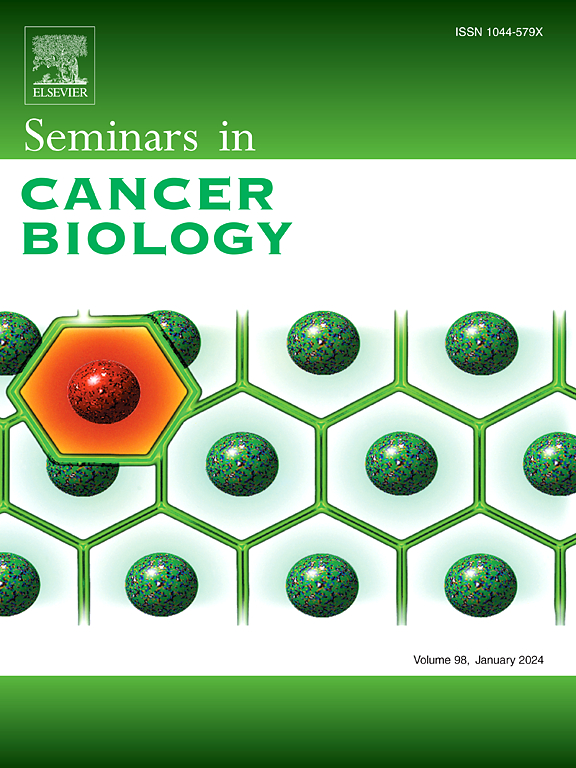沃伯格效应:癌症中被破坏的线粒体-核通讯。
IF 12.1
1区 医学
Q1 ONCOLOGY
引用次数: 0
摘要
线粒体-核通讯对维持细胞稳态至关重要。这种交流始于线粒体感知环境信号,并通过逆行级联将信号传递给细胞核,涉及代谢信号,如表观遗传修饰底物、ATP和AMP水平、钙通量等。这些信号通过顺行反馈级联作用,将细胞的代谢状态告知细胞核,重塑表观基因组,调控基因表达,调节线粒体功能和动力学,从而控制细胞命运和生理。这种交流的中断可导致细胞功能障碍和疾病进展,特别是在癌症中。Warburg效应是癌症的代谢标志,其特征是线粒体呼吸破坏和糖酵解产生的乳酸增加。这种代谢重编程重新连接逆行信号,导致表观遗传变化和去分化,进一步重编程线粒体功能并促进致癌。了解这些过程及其与肿瘤发生的联系对于揭示肿瘤发生机制至关重要。针对这些中断通路的治疗策略,包括代谢和表观遗传成分,为癌症治疗提供了有希望的途径。本文章由计算机程序翻译,如有差异,请以英文原文为准。
The Warburg effect: The hacked mitochondrial-nuclear communication in cancer
Mitochondrial-nuclear communication is vital for maintaining cellular homeostasis. This communication begins with mitochondria sensing environmental cues and transmitting signals to the nucleus through the retrograde cascade, involving metabolic signals such as substrates for epigenetic modifications, ATP and AMP levels, calcium flux, etc. These signals inform the nucleus about the cell's metabolic state, remodel epigenome and regulate gene expression, and modulate mitochondrial function and dynamics through the anterograde feedback cascade to control cell fate and physiology. Disruption of this communication can lead to cellular dysfunction and disease progression, particularly in cancer. The Warburg effect is the metabolic hallmark of cancer, characterized by disruption of mitochondrial respiration and increased lactate generation from glycolysis. This metabolic reprogramming rewires retrograde signaling, leading to epigenetic changes and dedifferentiation, further reprogramming mitochondrial function and promoting carcinogenesis. Understanding these processes and their link to tumorigenesis is crucial for uncovering tumorigenesis mechanisms. Therapeutic strategies targeting these disrupted pathways, including metabolic and epigenetic components, provide promising avenues for cancer treatment.
求助全文
通过发布文献求助,成功后即可免费获取论文全文。
去求助
来源期刊

Seminars in cancer biology
医学-肿瘤学
CiteScore
26.80
自引率
4.10%
发文量
347
审稿时长
15.1 weeks
期刊介绍:
Seminars in Cancer Biology (YSCBI) is a specialized review journal that focuses on the field of molecular oncology. Its primary objective is to keep scientists up-to-date with the latest developments in this field.
The journal adopts a thematic approach, dedicating each issue to an important topic of interest to cancer biologists. These topics cover a range of research areas, including the underlying genetic and molecular causes of cellular transformation and cancer, as well as the molecular basis of potential therapies.
To ensure the highest quality and expertise, every issue is supervised by a guest editor or editors who are internationally recognized experts in the respective field. Each issue features approximately eight to twelve authoritative invited reviews that cover various aspects of the chosen subject area.
The ultimate goal of each issue of YSCBI is to offer a cohesive, easily comprehensible, and engaging overview of the selected topic. The journal strives to provide scientists with a coordinated and lively examination of the latest developments in the field of molecular oncology.
 求助内容:
求助内容: 应助结果提醒方式:
应助结果提醒方式:


